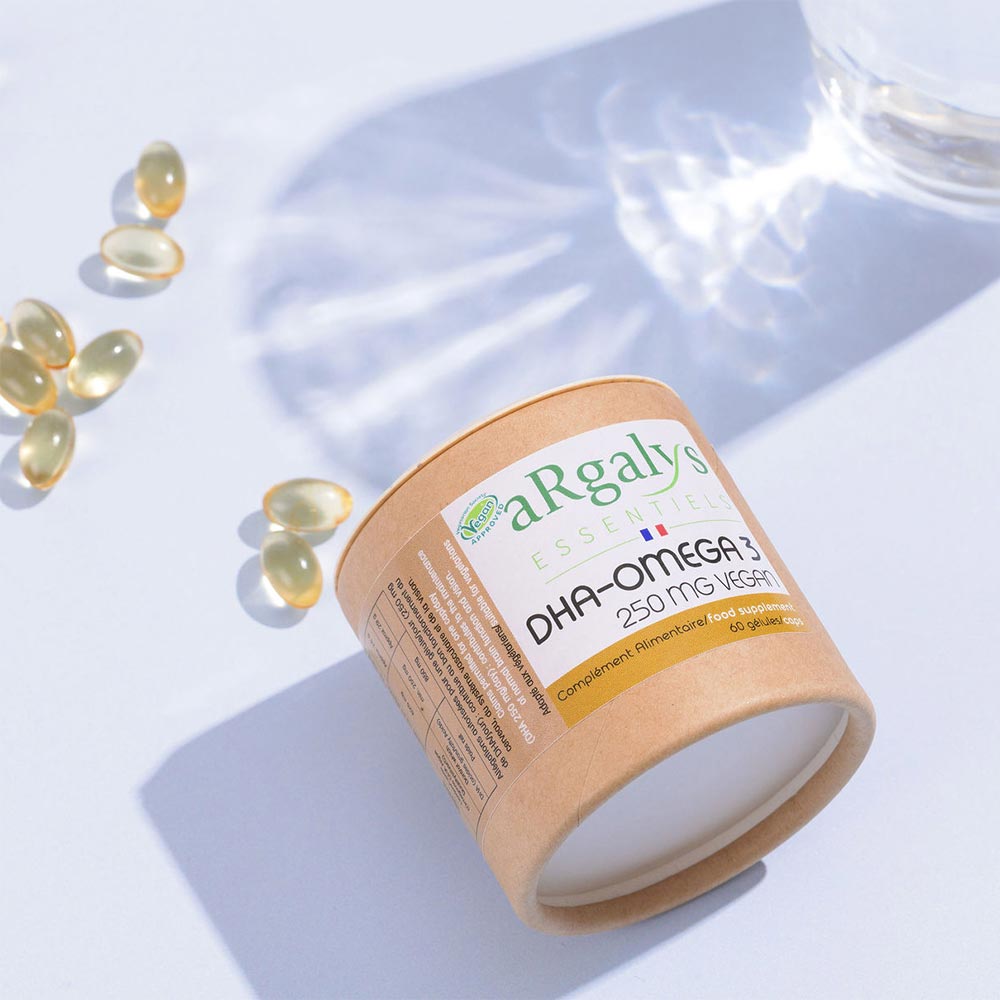
Breastfeeding pack
This pack combines a multivitamin, calcium with vitamins D3 & K2, and plant-based DHA to support a mother's increased nutritional needs during breastfeeding. A complete routine to preserve energy, protect bone capital, and support healthy infant development.
En savoir plusA complete routine to gently support breastfeeding
Our Breastfeeding Pack combines three essential supplements to support mothers and meet the specific nutritional needs of this key period. A synergy designed to preserve energy, promote recovery, and contribute to the healthy development of the baby.
Multivitamins & Minerals: a reinforced nutritional base
During breastfeeding, vitamin and mineral needs remain high. Our comprehensive formula provides 20 essential nutrients, including vitamins B12, D3, C, iodine, zinc, and selenium. It supports energy, immunity, and cognitive and nervous functions often challenged after childbirth.
Calcium + Vitamins D3 & K2: to preserve bone capital
During breastfeeding, calcium needs increase significantly. Our formula combines calcium carbonate with vitamin D3 to promote its absorption, and vitamin K2 MK7 for better fixation in the bones. An effective combination to support the mother's bone density and accompany the formation of the baby's skeleton, without interfering with other minerals.
Omega 3 DHA: for baby's development and emotional balance
DHA plays a key role in the development of a breastfed baby's brain and vision. It also contributes to the mother's emotional balance, stress reduction, and proper cardiovascular function. Our DHA is extracted from algae, pure, vegan, and highly dosed (250 mg per capsule).
Why this pack?
Breastfeeding puts a lot of strain on the body. By combining Multivitamins , Calcium D3 K2 and DHA , this pack offers complete nutritional support, respecting the needs of both mother and child. A simple, natural and 100% vegan routine to experience breastfeeding with more serenity and vitality.
Ingredients
Vitamin C
Vitamin C, present in our formula, is a powerful antioxidant that strengthens the immune system, helps fight oxidative stress, and supports collagen production for healthy skin, bones, and joints. It also plays a key role in iron absorption, helping to reduce fatigue and maintain optimal energy levels.
Magnesium Bisglycinate
It is an essential mineral for the proper functioning of the body. It contributes to the neuromuscular transmission of nerve impulses and plays a key role in many enzymatic reactions. Combined with vitamin D, it helps prevent osteoporosis by promoting bone health. In addition, magnesium helps reduce the symptoms of fatigue, providing daily energy support.
In our Multivitamin, magnesium is in the form of bisglycinate, offering optimized absorption and better digestive tolerance compared to other forms of magnesium. The presence of glycine, an amino acid, also promotes the formation of collagen, essential for the health of connective tissues and skin.
Vitamin B12
Absent from plant foods, this vitamin must absolutely be provided as a supplement.
It plays a fundamental role in the synthesis of body proteins and in the functioning of the brain and nervous system.
Sub-deficiencies in adults result in states of fatigue and nervous fragility.
For young people, pregnant women and seniors, it is not advisable to skip vitamin B12 supplementation equivalent to 100% of the daily requirement (adult RI). Consumer studies (Oxford-Epic, University of Brussels) show that vegans are significantly deficient in vitamin B12.
Vitamin D3
Essential for bone fixation, calcium is of non-animal origin.
A systematic intake guarantees good ossification, particularly when calcium intake is limited, in winter (exposure to the sun allows the body to synthesize vitamin D), and for sensitive populations (young people, seniors, pregnant women).
Vitamin A
The beneficial effects of vitamin A are numerous at appropriate dosages. It is essential for the proper functioning of vision and gene expression, particularly for all mechanisms of development and cell renewal from the fertilization of the embryo until the end of life. The molecular form of vitamin A is retinol (found in animal tissues: example: calf liver), however there are plant sources of provitamin A: carotenes, and mainly Beta Carotene. Beta carotene differs from retinol by two important properties: its antioxidant power (anti-free radicals) and its absence of risk during pregnancy.
https://www.anses.fr/fr/content/vitamine-carot%C3%A9no%C3%AFdes-provitaminiques
In our formula, vitamin A is now limited to 50% of the RDA and now in the form of Beta-carotene.This change was made to make supplementation safer for pregnant women.
This dosage excludes any risk of overdose for the young fetus (first 12 weeks). Indeed, pediatricians warn against possible risks linked to an overdose of Retinol (the other form of vitamin A) which can lead to malformations of the fetus during its first twelve weeks (reason why the consumption of liver or liver oil is strongly discouraged for mothers during this period).
What about beta-carotene in smokers?
Based on available scientific resultsEFSA(The European Food Safety Agency) concluded that beta-carotene does not increase the risk of lung cancer in heavy smokers at doses below 15 mg per day (and with regular intake over several years). In our formula, vitamin A is dosed at 0.4 mg, which is 37 times less than the maximum recommended dose.There is no risk associated with a moderate intake of 0.4 mg/day of vitamin A for smokers and ex-smokers.
*In France, for adults aged 18 to 79, the average daily intake of beta-carotene through food (fruits, vegetables, etc.) is 2.69 mg (source: ANSES).
Other vitamins
(E, K1 for fat-soluble, B1, B3, B5, B6, H for water-soluble) are provided safely because it is difficult to know the actual use of vitamins present in food.
Either because they are degraded by the food preparation process (cooking in particular).
Either because their actual absorption in the intestine is low and variable (and linked to the presence of certain other parameters: lipids, enzymes, intestinal flora).
Except for vitamin B12, the storage of water-soluble vitamins in the body is low, so it is important to have a guaranteed daily intake. When the recommended dose is reached (one capsule/day), there is no risk of hypervitaminosis.
Trace elements
Iodine, Selenium, Molybdenum and Zinc are trace elements present in many enzymatic reactions. Provided for safety reasons for sensitive profiles (young people, seniors, pregnant women), they do not represent any risk of overdose or renal fatigue at the recommended dose.
Calcium
Calcium is one of the most important minerals in the body, playing a key role in bone strength and skeletal structure. Calcium needs change during periods of major physiological changes such as growth and pregnancy. In addition, our longer lives highlight the importance of taking care of our bone mass to prevent diseases such as osteoporosis. That's not all, calcium also participates in important physiological mechanisms such as blood clotting, muscle function and cell division.
Vitamin K2
Vitamin K2, or menaquinone, helps calcium circulate and promotes its placement in bones. It plays a major role in arterial calcification (loss of arterial elasticity) and promotes good cardiovascular health. Vitamin K2 also plays a role in dental health and helps maintain good bones. Maintaining a vitamin K2 and calcium intake is therefore essential for disease prevention.
Omega 3 and DHA
Reminders on Omega 3 and DHA:
Omega-3s are long-chain polyunsaturated fatty acids (n-3 PUFAs) that are called essential because they are essential to the body (for its development and proper functioning).
The 3 constituents of PUFAs are:
TO THE
EPA
DHA
ALA is the precursor to the other two omega-3s. It must be obtained from food because the body cannot synthesize it.
Eicosapentaenoic (EPA) and docosahexaenoic (DHA) acids: these can be synthesized by our body from ALA.
But the conversion of ALA to DHA is in more than 90% of cases very insufficient to cover our needs.
It is therefore essential to provide DHA through food or supplementation.
The role of DHA:
DHA plays a fundamental role in the body:
For the proper functioning of the brain and nervous system: in particular, it increases resistance to nervous stress
during pregnancy: for the mother and the child (see below);
To combat fatigue and eye aging
To reduce the risk of high blood pressure;
For the most harmonious functioning possible of all physiological functions: its presence in all cell membranes and its active role in their exchange capacity, its influence on the synthesis of cholesterol largely explain its preventive virtues (anti-inflammatory etc.)
Other virtues of DHA:
DHA plays an important role in children and athletes
In children:It is essential for the proper development of the brain and nervous system. Logically, this begins during pregnancy and breastfeeding with the mother's diet sufficiently rich in DHA.
In Athletes: DHA has a triple beneficial role
Reduction of the impacts of muscle injuries
Reduction of inflammatory disorders resulting from intensive stress on ligaments and joints
Increase in the body's antioxidant capacity (which also allows for less cellular aging)
You can also check out the Blog article onthe benefits of Omega 3 and DHA.
 04 74 03 98 80
04 74 03 98 80








